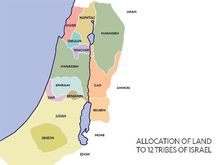Zelophehad’s daughters
By Admin | Miscellaneous

When the nation of Israel escaped from Egypt and travelled around in the wilderness for 40 years, Zelophehad’s daughters became some of the most famous women in the nation.
We know nothing much about Zelophehad, except that he had five daughters and no sons. Why was this important? Well, in Israel, a man left his land and goods to his sons. When a woman married, she joined the tribe of the man she married. Any children born to the couple also belonged to that tribe. Even foreign women could join the tribes of Israel in this way. Two examples: Rahab from Jericho and Ruth the Moabitess both married men from the tribe of Judah and thus joined the tribe of Judah.
Of course, most women married local men belonging to the same tribe so they didn’t transferred to another tribe. However, they were free to do so if they chose – in most cases.
Zelophehad was blessed with five daughters and there was nothing wrong with that. However, when the nation of Israel entered the land of Canaan, land was to be allocated to men. And by that time, Zelophehad was dead.
If nobody had asked the question, Zelophehad’s name would have disappeared from the areas allocated to the tribe of Manasseh. But someone did ask the question, and it was probably Zelophehad’s daughters since we are told that they appeared before Moses, Eleazar the High Priest, the other leaders and all the rest of the people. They explained the situation and asked to be given an inheritance among their father’s brothers.[1]
Moses immediately took the question to God, who told Moses that the five daughters were right. If a man had only daughters, those daughters should inherit his land.[2]
Aside: You may wonder what would happen if a man had no children at all. The answer God gave was that the inheritance was to go to the man’s brothers. If there were no brothers, it went to the man’s father’s brothers. If there were none of them, then it went to the “nearest kinsman” – the closest relative.[3]
So far, so good!
Apparently, though, some time later, someone realised that giving the inheritance to the daughters didn’t completely solve the problem. Since a woman joined the tribe of the man she married, any land she inherited would be transferred to her husband’s tribe – if she married someone from another tribe. Once again, Zelophehad’s daughters are used as the example, so perhaps they were the ones who first realised the complication. Whoever who realised the problem, though, it was the leaders of Zelophehad’s clan who approached Moses and the leaders. They described the problem and asked whether that was the intended result. Once again, God answered the question. He said that where women were to inherit land, they must marry within their tribe so that the land would not be transferred into another tribe.[4]
When the land was being allotted to the tribe of Manasseh, Zelophehad’s daughters received the land that their father would have been given if he had survived,[5] and they all married sons of their father’s brothers.[6] Simple and satisfactory.
This story is told in a micro-tale “I was Just Thinking…” included in “Fiction Favours the Facts – Book 3”. If you want more information, see Fiction Favours the Facts.
Here is an excerpt from the story:
“But everyone knew that inheritance went through the men of the family. It was sad, but Zelophehad had missed out badly when he had all daughters and no sons.
At that moment, Noah and her sisters decided that they were not willing to allow that to happen without a fight. Father deserved that they at least make an effort to ensure that he didn’t slip from the memory of the nation, the tribe or the clan.
They started the official wheels turning, and within days, the echoes of their question had reverberated even in the ears of Moses. A time was set for this extraordinary question to be considered by Moses, Eleazar the priest and the leaders of the congregation. It was to be an open hearing: anyone could be present to listen, and many took an interest in this strange situation.”
This is one of a series of articles published as back-up material for our Bible-based micro-tales contained in the series of books: Fiction Favours the Facts.
[ More information | Purchase ]